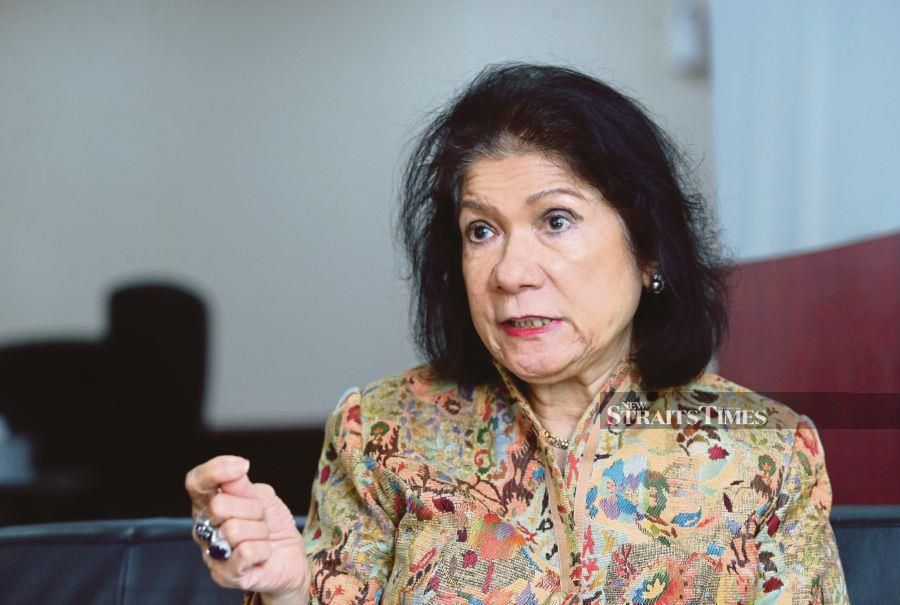
Human Resources Development Fund chairman Datuk Noor Farida Mohd Ariffin speaking in an interview at Balai Berita in Kuala Lumpur recently. – NSTP/ Rohanis ShukriBy Esther Landau – November 21, 2019 @ 12:02pm
KUALA LUMPUR: The number of registered Malaysian employers and employees under the Human Resources Development Fund (HRDF) has steadily increased after Pakatan Harapan took over the government in May last year.
HRDF chairman Datuk Noor Farida Mohd Ariffin said as at last Thursday, 29,163 employers have registered with the fund compared with 28,991 as at last month.
She said 2.42 million employees have registered with HRDF compared with 2.41 million as at last month.
HRDF expects to register at least 30,000 employers, or 30 per cent, by year end.
“The total number of employers that are supposed to be registered under the Pembangunan Sumber Manusia Bhd Act 2001 should be 42,824, or 68 per cent. For employees, we have covered about 93 per cent of an estimated 2.60 million.
“We register about 100 local companies in a week. In order to encourage them to register with us, we constantly engage with them through various platforms and initiatives.
“So far, we have engaged with 20,233 employers and these initiatives are mainly to update or register employers on the latest offerings, services and many more,” she told the New Straits Times in an interview at Balai Berita here recently.
Touching on absenteeism among employers and workers during training programmes conducted by HRDF, Farida said the trend was worrying.
She said the problem occurred mainly among the small and medium enterprises, as many of them were reluctant to conduct training programmes for their employees, claiming it was a waste of time.
“Therefore, we constantly engage with the employers to convince them of the benefits of training. The workers need to be upskilled to prepare them for future challenges.
“We are trying to overcome this situation through such engagements. Perhaps we can introduce new methods, such as a facial recognition system, to aggressively encourage them to attend the training programmes. However, this is still under discussion,” she said.
HRDF chief executive Elanjelian Venugopal said they were looking at developing a comprehensive system to predict fraud elements in the data collected.
He said the Fund conducted about 130,000 training sessions in a year, and with such a system, they could predict areas which were likely to be fraudulent.
“Once it is in place, we can identify who actually attends the training programme or stays throughout the session.
“Another method we are looking at is Geofencing technology, which can trigger a response when a mobile device enters or leaves a certain area or location.
“The system can track your attendance and whereabouts when activated. With such a technology, we are able to identify anyone who is cheating.
“They will be charged within our act and we have the right to penalise the employers and training providers caught cheating.”
On the 2020 Budget allocation announced by Finance Minister Lim Guan Eng last month, Farida said the RM50 million would be utilised for Technical Vocational Education and Training (TVET) and other upskilling and training programmes.
She said RM30 million would go towards TVET initiatives, aimed at reducing the unemployment rate.
She said HRDF would continue to collaborate with the Human Resources Ministry, industry players, employers and many other stakeholders.
“They will provide the TVET programmes to at least 3,000 youths from the low-income groups, mainly the B40.
“The remaining RM20 million of the allocation, plus an additional RM20 million from us, will be used for upskilling at least 4,000 Malaysians through professional certification examinations related to the Industrial Revolution 4.0.”
HRDF, she said, would continue to implement other initiatives for housewives, disabled (and differently-abled), retirees, graduates and school-leaver groups.
She said among them were the Housewives Enhancement and Reactivate Talent Scheme, Graduates Enhancement Programme for Employability 2.0 and the National Dual Training System.
“We have a scheme specifically designed to assist the disabled in securing employment by furnishing them with appropriate knowledge skills and competencies required in the industry.
“One of the schemes is OKU Talent Enhancement Programme. A total of 413 disabled people have been trained as at last month.
“The modules include English Proficiency Conversation online, Certificate in Hospitality Operations, Professional Certificate Retail Operations and Electrical Machinery Skills Training.”
Source: https://www.nst.com.my/